Related news by tag NANOGUNE
Great response marking nanoGUNE’s 5th year anniversary
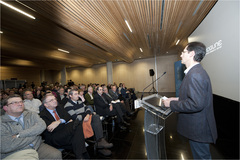
During the center’s early days “what we wanted to do was carve ourselves out a niche and make ourselves known through our contributions,” as nanoGUNE’s Director General Jose Maria Pitarke asserted. Five years have passed since then, and “the assessment is very positive and very encouraging. We have exceeded all expectations,” pointed out Pitarke at the start of the open day to celebrate the center’s 5th year anniversary. “Not only have we set up a infrastructure of the highest standard, we have also managed to draw a large number of Ikerbasque researchers, all highly recognized in their respective fields,” he stressed. Pitarke insisted that it is necessary to go on transmitting knowledge to companies. “That’s what we’ve done until now and it is the great challenge in store for us in the future,” he said.
The scientific workshop took place throughout the morning; in it the speakers Niek van Hulst (ICFO, Barcelona), Víctor Muñoz (CSIC, Madrid), Kirsten von Bergmann (University of Hamburg) and José María de Teresa (CSIC, Zaragoza) covered subjects like protein folding, nanophotonics, spintronics and nanomagnetism.
Open day
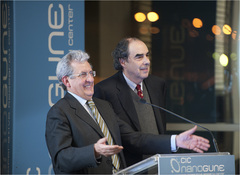
NanoGUNE’s chairman, Pedro Miguel Etxenike, officially opened the afternoon session of the open day. He took advantage of the opportunity to express his satisfaction for the degree of development of a project he has always believed in. “Because in a matter of a few years I saw that nanoGUNE had turned into a top international center in research, able to attract the cream of creative talent, produce cutting-edge science, transmit knowledge to the production base and create new companies. Something that is very difficult to achieve here or anywhere else,” he pointed out. “The success is due to collective effort,” so he expressed thanks for the work of nanoGUNE’s Board of Trustees, the Scientific Committee, the managers, researchers and technicians. Etxenike highlighted how essential the continued support of the Government of the Basque Autonomous Community is and described its long-term, strategic vision as decisive for setting up a framework enabling creativity to flourish. Such policies need to continue to provide the project with stability. Etxenike sincerely thanked the center’s Director General Jose Maria Pitarke for his work. “Starting from scratch he has managed to create premises and equipment that are state-of-the-art worldwide, draw talent, design and maintain the strategic lines as well as contribute to the industry of our country. All this can only be achieved by building the confidence of many people, and to do this the talent, determination and untiring work are necessary conditions, but insufficient on their own. What is also needed is solid human experience and generous, integrating leadership.” Etxenike described Pitarke as the great architect of nanoGUNE’s success.
After that, Félix Ynduráin, Professor in the Department of Condensed Matter Physics of the Autonomous University of Madrid, gave a talk on “Nanoscience and future energy technologies.” How are we going to meet future energy demand? What role does nanoscience play? These are just some of the questions Ynduráin tackled in his talk. After analyzing the evolution in energy consumption worldwide, and the perspectives on its future evolution, he focused on the need for new developments to meet future energy demands. In particular, he discussed some specific examples of the role played by nanoscience in nuclear and photovoltaic energy, the use of hydrogen, energy and CO2 storage, electrical power transportation, etc. “The development of new materials on a nanoscale, as well as methods for characterizing and manipulating them, create a fresh paradigm for the development of new, revolutionary energy technologies,” stressed Ynduráin.
After the talk came the moment to visit the very core of nanoGUNE. This initiative was a resounding success, as venue capacity had been reached some days previously. Those who went on the visit had the chance to see the clean room, a microscope unique worldwide that allows electronic, mechanical and optical properties to be measured on an atomic scale, an electron microscope with which they saw graphene produced by Graphenea, nanoGUNE’s first start-up, and a whole series of technologies spread around various laboratories free of vibrations, electromagnetic interference, noise and dirt. An all-round trip to the nanoworld within reach of members of the general public.
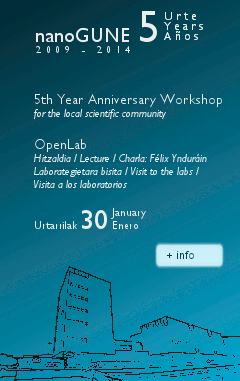
CAF, Petronor, and IKOR, new nanoGUNE partners
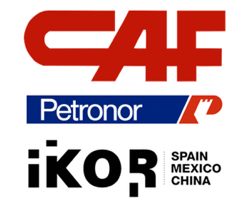
Since nanoGUNE was set up in 2009, it has established itself as a leading center in nanoscience and nanotechnology research. The activity it is involved in is of a multidisciplinary nature and close to subjects in the realm of industrial application. The development that nanoGUNE has undergone up until 2015 has allowed it to provide itself with the human resources and infrastructure it needs to occupy a leading position in the research being carried out in nanoscience on a global level. In this period, advantage has also been taken of the various opportunities that have emerged to drive forward the development of new technology and the creation of new nanotechnology-based companies, such as Graphenea, Simune, Ctech-nano and Evolgene. So the bases are now in place to enable nanoGUNE to concentrate its efforts on activities geared towards encouraging competitive growth based on nanotechnology, while maintaining at all times the level of excellence in the research projects it carries out.
In this new phase it will be particularly important to have the advice and involvement of business players so that companies can benefit as much as possible from the recent developments offered by nanoscience and nanotechnology, and so that the nanoGUNE research team can benefit from their market perspective.
Transferring knowledge and technology
The incorporation of the companies CAF, Petronor, and IKOR as nanoGUNE’s partners is addressing the research center’s commitment to have top-level industrial experts to reinforce its strategy for transferring knowledge and technology. The commitment of these three leading companies in priority areas in the Smart Specialization Strategy (RIS3) of the Basque Government will no doubt bolster the center’s strategic mission and allow it to reinforce the work it has been doing with and for industry.
The potential of nanoscience and nanotechnology has been recognized across the world, “but the gap between research and the market remains huge,” explained José María Pitarke, nanoGUNE’s Director. ”However, things have started to change over the last few years. They continue to be emerging fields, but the interest is increasing steadily, and some commercially viable processes and products are already available in nearly all the industrial sectors". The European Commission has estimated that the global market for nanotechnology-based products has increased by 50% a year since 2009, and exceeds a trillion euros. “But beyond the market dimension, what is really important for the Basque Country is that nanotechnology should play a pivotal role in improving many industrial sectors that form the basis of our economy," concluded Pitarke. “We have not in fact remained immune from the global development of nanotechnology, since the Basque Country is already seeing the flourishing of the first fruits of the significant investment effort made in this field."
CIC nanoGUNE
The nanoGUNE Co-operative Research Center (CIC), located in Donostia-San Sebastian, Basque Country, is a research center set up with the mission to conduct excellent research in nanoscience and nanotechnology with the aim of increasing the Basque Country’s business competitiveness and economic growth.
CAF
A Basque company founded in 1917 that is seeking global leadership in the manufacture and supply of railway rolling stock equipped with cutting-edge technology with maximum reliability. Website: www.caf.es
Petronor
Basque company founded in 1968 with the aim of refining and marketing petroleum products and by-products. Today, it is pursuing an aim of ongoing improvement enabling it to compete on the international market and to plough back the fruits of its success into the environment that supports it. Website: www.petronor.com
IKOR
A Basque company that offers comprehensive design, development, and electronic manufacturing (EMS) services worldwide geared towards all the sectors in which electronics is the core in the functioning of the end product. Website: www.ikor.es
NanoGUNE's new website: a space for everyone
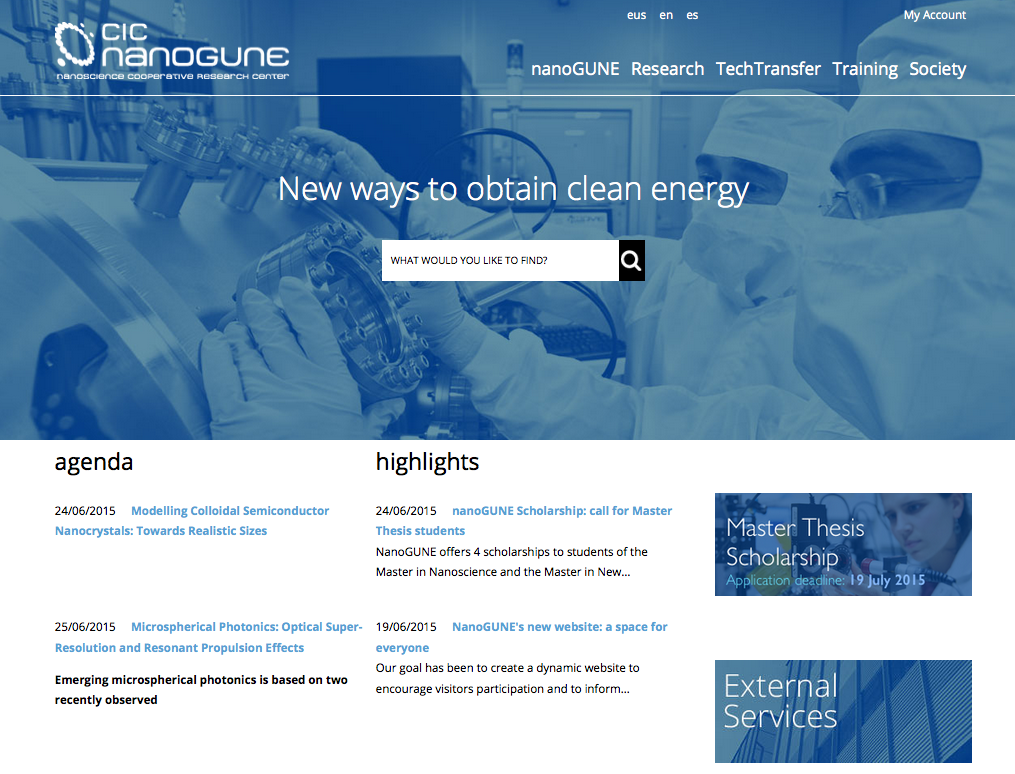
CIC nanoGUNE has launched the updated version of it’s website (www.nanogune.eu). The site has been thought to fulfill the center’s mission, and to bring the social benefits of the “nano” closer to the Basque companies.
The new website has an English version and, for the first time, it is also possible to navigate in Basque and Spanish. The biggest part of the content can be accessed in the three languages in order to answer to the necessities of our very diverse public.
With that diversity of publics in mind we designed the different sections of the website:
- The “nanoGUNE” section includes corporative information, information about facilities and equipment, contacts, job offers, a newsroom and useful information about the day to day life with us.
- The “Research” area is specially designed for researchers worldwide, this is the reason why most of the information is only accessible in English. The user will be able to explore nanoGUNE's main research lines, as well as information about research groups and projects.
- The “TechTransfer” space is focused on the activity and services more related with industry, being a space specially designed for companies.
- The “Training” area has information related with university and high school students and teachers. Offers for PhD thesis, master degree projects or bachelor's final projects can be found here, as well as calls for scholarships. This section also informs about activities for high school students and teachers, and includes links to different educational material.
- In “Society” is intended to report on activities open to all citizens and to spread clear and reliable information on nanoscience and nanotechnology In this section, for example, citizens have the opportunity to send their doubts and questions about “nano”.
Together with the website, we have also prepared a newsletter, the best way to keep informed about all the activity of the center. Everyone is welcome to subscribe to this service.
nanoGUNE Scholarship: call for Master Thesis students
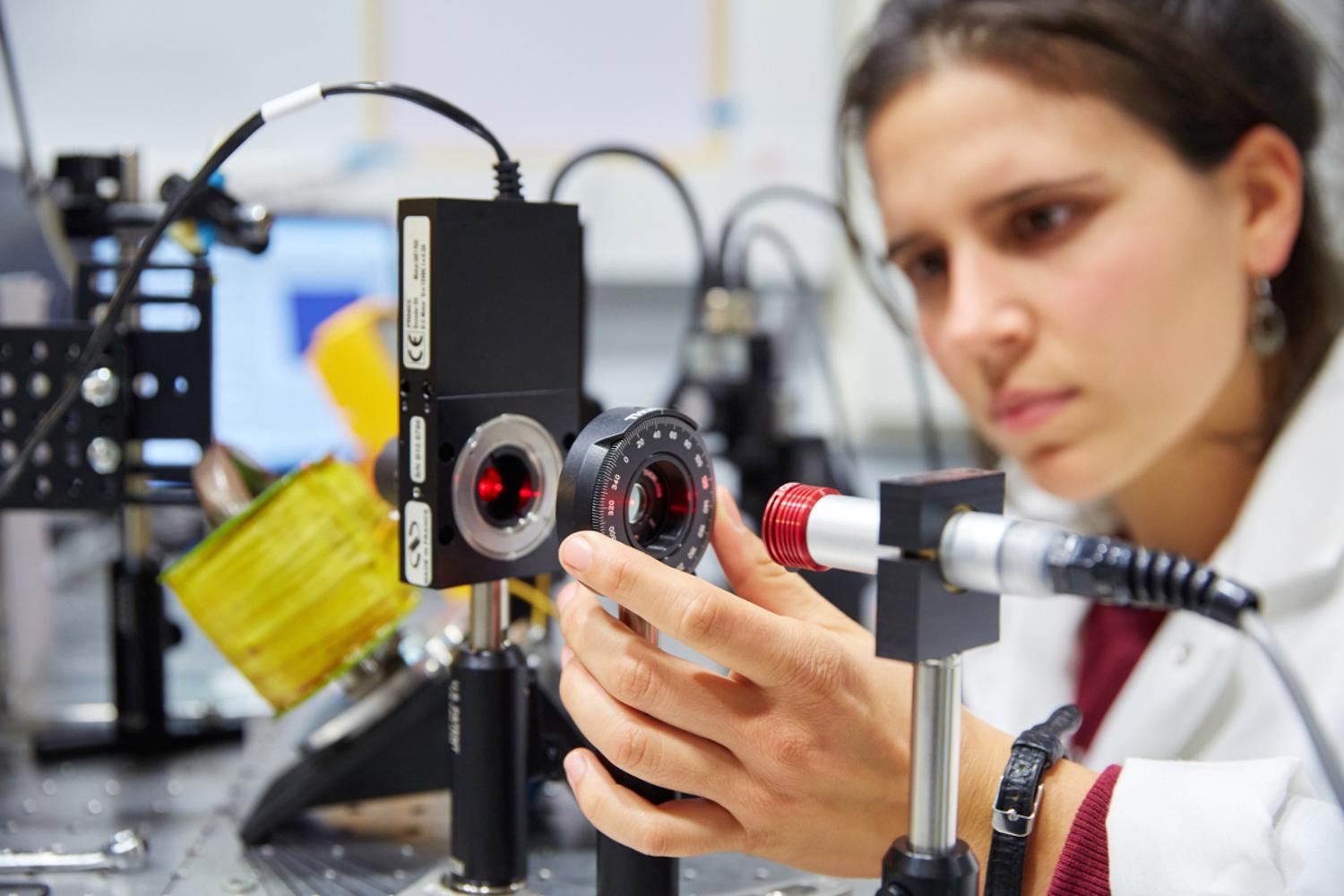
The Scholarships will be of a total amount of 3,000€. This amount is for the whole period and will not be compatible with any other grant or funding awarded for the same purpose. Candidates have to be pre-registered and accepted at the above mentioned Master degrees in order to be eligible for these grants. Interested candidates can find all the information about the offered master projects and the application process following this link.
Besides the grants, nanoGUNE offers Master students coming from any official Master degree the possibility to develop their Master Thesis within one of its research groups.
